Top Rankings
Parkrose SD 3 School District ranks among the top 20% of public school district in Oregon for:
Category
Attribute
Diversity
Most diverse schools (Top 1%)
For the 2025 school year, there is 1 public preschool serving 287 students in Parkrose SD 3 School District. This district's average pre testing ranking is 3/10, which is in the bottom 50% of public pre schools in Oregon.
Public Preschool in Parkrose SD 3 School District have an average math proficiency score of 17% (versus the Oregon public pre school average of 33%), and reading proficiency score of 37% (versus the 42% statewide average).
Minority enrollment is 69% of the student body (majority Hispanic), which is more than the Oregon public preschool average of 52% (majority Hispanic).
Overview
This School District
This State (OR)
# Schools
6 Schools
91 Schools
# Students
2,798 Students
29,714 Students
# Teachers
144 Teachers
1,885 Teachers
Student : Teacher Ratio
19:1
19:1
District Rank
Parkrose SD 3 School District, which is ranked within the bottom 50% of all 186 school districts in Oregon (based off of combined math and reading proficiency testing data) for the 2021-2022 school year.
The school district's graduation rate of 69% has decreased from 76% over five school years.
Overall District Rank
#149 out of 189 school districts
(Bottom 50%)
(Bottom 50%)
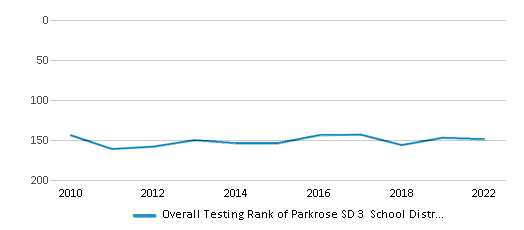
Math Test Scores (% Proficient)
17%
31%
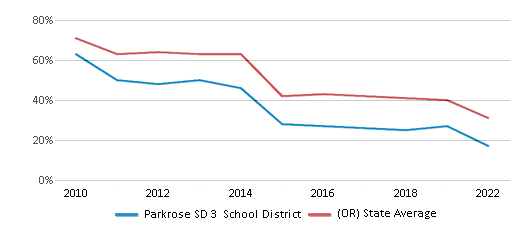
Reading/Language Arts Test Scores (% Proficient)
36%
44%
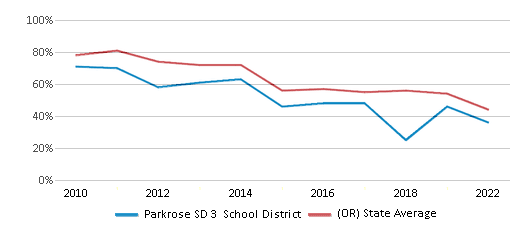
Science Test Scores (% Proficient)
17%
30%
Graduation Rate
69%
81%
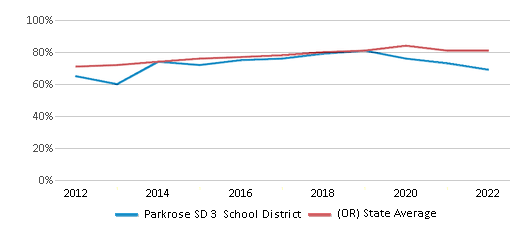
Students by Ethnicity:
Diversity Score
0.79
0.67
# American Indian Students
12 Students
200 Students
% American Indian Students
n/a
1%
# Asian Students
256 Students
1,549 Students
% Asian Students
9%
5%
# Hispanic Students
835 Students
8,817 Students
% Hispanic Students
30%
30%
# Black Students
516 Students
1,664 Students
% Black Students
19%
6%
# White Students
789 Students
14,394 Students
% White Students
28%
48%
# Hawaiian Students
99 Students
371 Students
% Hawaiian Students
4%
1%
# Two or more races Students
265 Students
2,665 Students
% of Two or more races Students
10%
9%
Students by Grade:
# Students in PK Grade:
-
-
# Students in K Grade:
182
4,906
# Students in 1st Grade:
182
4,696
# Students in 2nd Grade:
200
4,983
# Students in 3rd Grade:
192
4,490
# Students in 4th Grade:
203
4,747
# Students in 5th Grade:
164
4,341
# Students in 6th Grade:
205
599
# Students in 7th Grade:
205
330
# Students in 8th Grade:
254
296
# Students in 9th Grade:
267
77
# Students in 10th Grade:
269
82
# Students in 11th Grade:
240
91
# Students in 12th Grade:
235
76
# Ungraded Students:
-
-
District Revenue and Spending
The revenue/student of $18,277 in this school district is less than the state median of $18,279. The school district revenue/student has grown by 5% over four school years.
The school district's spending/student of $15,948 is less than the state median of $19,325. The school district spending/student has grown by 5% over four school years.
Total Revenue
$51 MM
$9,902 MM
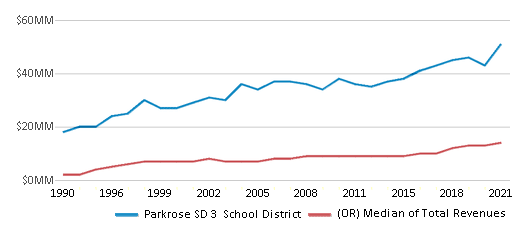
Spending
$45 MM
$10,468 MM
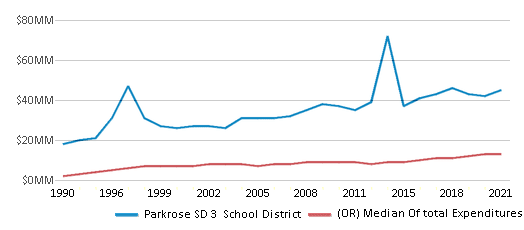
Revenue / Student
$18,277
$18,279
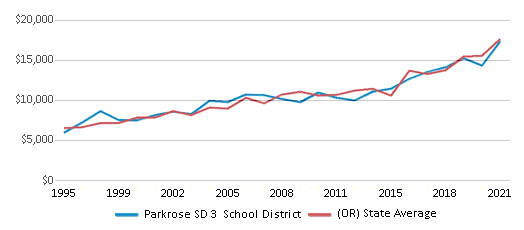
Spending / Student
$15,948
$19,325
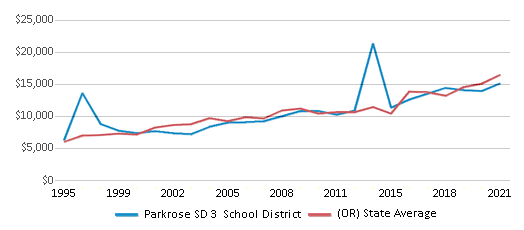
Best Parkrose SD 3 School District Public Preschools (2025)
School
(Math and Reading Proficiency)
(Math and Reading Proficiency)
Location
Grades
Students
Rank: #11.
Prescott Elementary School
(Math: 15-19% | Reading: 35-39%)
Rank:
Rank:
3/
Bottom 50%10
10410 Ne Prescott St
Portland, OR 97220
(503) 408-2150
Portland, OR 97220
(503) 408-2150
Grades: PK-5
| 287 students
Recent Articles

Year-Round Or Traditional Schedule?
Which is more appropriate for your child? A year-round attendance schedule or traditional schedule? We look at the pros and cons.

Why You Should Encourage Your Child to Join a Sports Team
Participating in team sports has a great many benefits for children, there is no doubt. In this article you will learn what those benefits are.

White Students are Now the Minority in U.S. Public Schools
Increasing birth rates among immigrant families from Asia and Central and South America, combined with lower birth rates among white families, means that for the first time in history, public school students in the United States are majority-minority. This shift in demographics poses difficulties for schools as they work to accommodate children of varying language abilities and socio-economic backgrounds.





